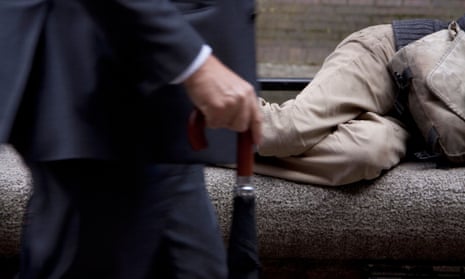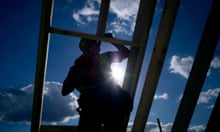The UK is in breach of its own United Nations human rights commitment to provide people with adequate homes because the housing crisis is so serious, a consortium of leading housing charities has warned. They cite soaring housing rental costs, unhealthy conditions in homes, and rising levels of homelessness and warn of “profound issues of lack of supply, increasing housing costs, lack of security of tenure and homes of such poor quality that they are unfit for habitation”.
Called Just Fair, the group’s members include Crisis, Oxfam, Amnesty International, Save the Children and Unicef UK. Their document describes the right to housing in England as in “crisis”.
“It is quite clear we are in breach of our UN obligations,” said the report’s author, Dr Jessie Hohmann, law lecturer at Queen Mary University of London. “It is possible to take policy steps to protect the most vulnerable and marginalised, but the UK government has decided not to do that. Since the 1980s we have lost any concept of housing’s social function, and that is why protest movements are gaining ground. Without decent housing, you can’t experience an adequate life in society, but now housing is seen just as an asset.”
In a 40-page report, Just Fair concluded:
- Private rents are at double the level of council properties, at £163 a week, and a quarter of those renting rely on housing benefit to meet the cost
- A third of homes in the private rented sector do not meet basic standards of health, safety and habitability
- Rough sleeping in London increased by more than a third between autumn 2013 and autumn 2014, while funding for shelters fell
- Last December there were almost 62,000 households in England living in temporary accommodation, the highest number for five years, and 280,000 households are at risk of homelessness
- The number of families living in bed and breakfasts more than tripled from 630 in 2010 to 2,040 last year
- “Exceptionally high” levels of rising homelessness and the growing number of households at risk of homelessness represent “a serious failing in the government’s obligations”, it concludes.
According to Just Fair, the UN agreement to “recognise the the right of everyone to an adequate standard of living … including housing” only allows reduction in rights to housing in cases of “force majeure”, including natural disaster and war, and cuts executed during financial crises must be ended when the crisis is over.
The report cames as party leaders trade blows over housing in the general election campaign. Jon Sparkes, chief executive of the homeless charity Crisis, said the report “should be a wake-up call for all political leaders”. On Sunday, Labour announced plans for rent controls in the private sector, while the previous week the Conservatives said they would extend the right-to-buy to housing association tenants.Grassroots residents’ rebellions against evictions and social housing sell-offs have also focused public anger on the state of the housing market.
Just Fair is overtly critical of coalition policy on housing. Its report said: “Problems in realising the right to housing are linked to a political climate of austerity, and attendant cuts to state social security and other benefits. The resulting situation is accurately identified as one of crisis.” It also says one of the most serious issues is the failure to build enough new homes, which dates back through successive Labour, as well as Conservative, governments.
Among the causes of the worsening crisis, the report also cites the government’s removal of the “spare room subsidy”, also known as the bedroom tax, the “stark undersupply” of new homes, and insecurity of tenure in the private rented market as a result of a the lack of protections in tenancy agreements. “It should be a matter of significant concern that one-third of households in the private rental sector are living in housing that is substandard to the point that is unsafe or unhealthy,” the report states.
The report suggested that so called “Revenge evictions”, where tenants lose their homes when they complain about standards, are so widespread that as many as 200,000 happening in 2013. That, Just Fair argued, amounted to a breach of the UN covenant’s prohibition against arbitrary eviction.
Responding to the report, Conservative housing minister, Brandon Lewis, said: “We inherited a broken housing market after Labour’s housing crash.” He added that “there is more to do”, but said his party would deliver 275,000 new affordable homes in the next parliament.
“Despite the need to pay off Labour’s deficit, Conservatives in government have worked to increase housebuilding to its highest since 2007 and delivered 217,000 new affordable homes,” he said. “We will ensure economic growth and stability to allow continued investment in frontline services for homeless and the vulnerable.”
For Labour, Emma Reynolds said: “Under David Cameron, housebuilding is at its lowest levels in peacetime since the 1920s, there is a severe lack of affordable homes, families face growing insecurity in the private rented sector, and there has been a dramatic rise in homelessness and rough sleeping. Labour will take action to tackle this crisis.
“We will get 200,000 homes built a year by 2020, boost the number of affordable homes built year on year, reform the private rented sector, and we will set out a long-term strategy to tackle homelessness and rough sleeping.”
“Rough sleeping has risen by 55% in the past five years,” said Sparkes. “This dreadful state of affairs is the result of successive governments’ failure to tackle the housing crisis, combined with severe cuts to housing benefit that have left growing numbers of people struggling to keep a roof over their heads. The housing crisis will not solve itself. We desperately need more affordable homes as well as political action to fix our broken private rented sector.”
The report is intended to inform a UN audit of housing in England starting this autumn. It was largely funded by the Joseph Rowntree Charitable Trust.




